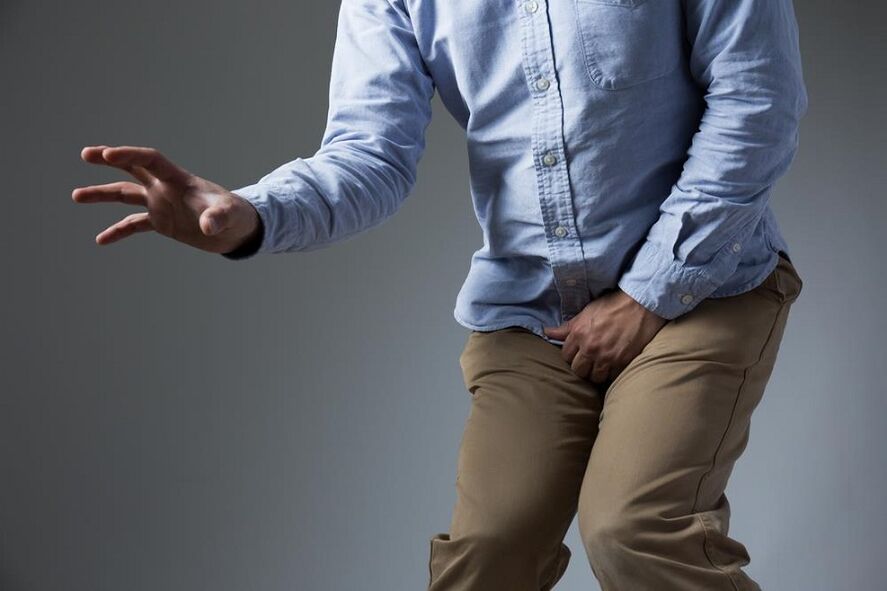Prostatitis is the most common male disease and is very insidious.Prostatitis often develops in chronic form precisely because its first symptoms go unnoticed.They can be expressed to varying degrees, appear alone or several at a time.One thing is important: you need to know them to recognize and consult a doctor on time.
Symptoms of acute prostatitis

In most cases, the clinical picture of acute prostatitis is very similar.Of course, there may be individual characteristics, but they do not prevent an experienced doctor from recognizing the enemy accurately.The signs are customary to divide into groups:
Common manifestations
- Increasing temperature, most often significantly.
- Deept: Weakness, malaise, fatigue, decrease in the level of physical activity.As a result of this reduction in productivity.
- Laboratory indicators: The results of blood and urine tests signal the presence of an inflammatory process.
The cost of these characteristics is not unique to prostatitis - here is how inflammatory diseases of other small pelvis can be manifested.The picture becomes much more clear with the onset of local symptoms.
Local symptoms
- Discomfort in the groin.Appears with physical or sexual activity after some time at rest.The discomfort manifests itself in the form of itching, burning, feelings of bursting in the groin or in the urethra.
- Perineum pain, groin, testes.The discomfort is rapidly developing in the pain syndrome.Its intensity is proportional to the intensity of the inflammatory process and can even indicate what infection the cause of prostatitis is.
- Mucosa discharge.Transparent or whitish, appear at the initial stage.Evidence of pronounced inflammation.
- Impurity of blood.It is most commonly found in the form of hematospermia - coloring ejaculation through blood or at the end of urination.Spontaneous mucous membranes with blood impurity are sometimes possible.
- Constipation.Due to the anatomical proximity, the inflammation of the prostate gland also affects the gastrointestinal tract.
- Difficult urination.Initially, it is manifested by incomplete emptying of the bladder and the need to press.Next, there is a weakness of urine flow, which can develop in the impossibility of independent urination when filled with a bladder.
Intimate disorders

Often, the problems in the intimate sphere are the most painful for men.Progressive prostatitis gradually causes a decrease in sexual activity, weakens libido.Psychological problems join physical problems and together they inevitably lead to erectile dysfunction.
Symptoms of chronic prostatitis
In the exacerbation phase, clinical manifestations are similar to the symptoms of acute prostatitis.In the remission phase, there are certain violations, expressed to varying degrees.As a rule, the symptoms are more rubbed.
Asymptomatic form
Asymptomatic prostatitis - the phenomenon is quite rare.The disease lasts for a long time without characteristic symptoms: no pain, no problems with urination, no weakness, the temperature is normal.This happens if the immunity is high.With a decrease in immunity, characteristic symptoms of prostatitis begin to manifest.
The lack of signals from the body interferes with timely diagnosis and therefore through successful treatment.Such prostatitis is discovered by accident.Therefore, it is important to regularly undergo a medical examination, even if nothing is worried.
Treatment characteristics
Most importantly: there is no self -self!Only a doctor (urologist, andrologist) based on patient complaints, examination, various analyzes and examinations can make an accurate diagnosis.
In the case of acute prostatitis, the purpose of therapy is to complete treatment and prevent the transition of the disease to chronic form.But even if the prostatitis is chronic, you should not despair: properly selected treatment regimen and adherence to your doctor's recommendations will achieve long remission and a significant reduction in exacerbations.
The composition of complex therapy of both acute and chronic forms of prostatitis must include medicines to restore prostate function.Most often these are candles.Medicines have a systemic effect: improving microcirculation and blood supply, relieving swelling and venous stagnation, elimination of inflammatory phenomena, restoration of tissues and prostate functions.
Thanks to the introduction of candles into the treatment regimen, it is possible not only to reduce therapy (up to 10 days), but also to increase the conditions of remission.

































